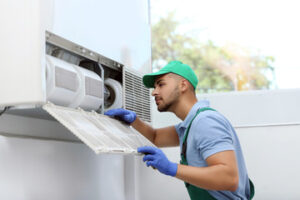Heating and air conditioning (HVAC) systems are important components of most buildings, including residential structures, medium-large industrial buildings, and office buildings. These systems use the principles of thermodynamics to maintain comfortable air temperatures and humidity levels. Heating and cooling systems send air to a compressor where it is heated or cooled, removing humidity before directing it into a building. HVAC uses fresh air from the outdoors to maintain a comfortable temperature.
 Choosing an HVAC contractor should be an essential decision. The job requires extensive training and national and state certifications and is best left to experienced professionals. While homeowners can perform simple tasks such as changing filters, licensed contractors should be hired to perform full installations and repairs. HVAC equipment requires specialized skills, including metalwork, carpentry, and ductwork. However, it’s not always possible to avoid hiring a professional. HVAC technicians should be licensed in every state and local jurisdiction.
Choosing an HVAC contractor should be an essential decision. The job requires extensive training and national and state certifications and is best left to experienced professionals. While homeowners can perform simple tasks such as changing filters, licensed contractors should be hired to perform full installations and repairs. HVAC equipment requires specialized skills, including metalwork, carpentry, and ductwork. However, it’s not always possible to avoid hiring a professional. HVAC technicians should be licensed in every state and local jurisdiction.
Packaged HVAC systems contain a heating and cooling unit in a single system. They are typically mounted on a roof or near the foundation. The advantage of packaged HVAC systems is that they can be easily maintained and are highly energy efficient. Packaged HVAC systems can also be powered by electricity or gas and easily installed. They are also a good option for smaller homes where space is a consideration. Ultimately, choosing the best HVAC system depends on your preferences and budget.
Depending on your location and climate, the best HVAC system will depend on your needs and budget. If you live in a moderate climate, you should consider a ductless or central HVAC system. HVAC systems are most effective in these environments. Energy efficiency is another important consideration. The larger the house, the more HVAC equipment you will need. You’ll also want to consider the installation system you choose. This is not always easy – make sure to ask an HVAC expert before you make a purchase.
An HVAC system distributes air in your home by using ductwork and vents. Vents direct air downwards while those point direct air upwards. It’s important to remember that the ductwork is connected through a piping system. Changing a thermostat can change the airflow, causing your HVAC system to work overtime. An improperly calibrated thermostat can result in a home or building that is too cold or too hot.
The HVAC-R technician program at Coyne College offers both day and night programs. You can finish the course in as little as 42 weeks. The campus is conveniently located in the heart of Loop. This program is ideal for those who want to start a career in the HVAC industry. And the pay is fair! Despite the long hours, the training is well worth the investment! When you finish an HVAC-R program, you’ll be well-equipped to work in a commercial or outdoor environment.
HVAC systems regulate the temperature and air quality of indoor spaces. The system includes three main elements: ducts, coils, and a blower. Some AC systems also have a heater feature. The ventilation system of an HVAC system can be natural or artificial. Depending on the needs of the building, it can also have an air cleaning component. Sometimes, a single unit may be used for all three functions. The system might be referred to as a multi-system HVAC system when you use several units in a building.
If you’re concerned about air quality in your building, you’ll want to check the ducts. While most buildings have air ducts contaminated with mold and other harmful elements, new ones should be lined with duct board or a duct liner. These materials also offer excellent thermal and acoustic properties. As long as you follow the manufacturer’s instructions, there’s no greater risk of mold growth in these systems.
Another problem with your HVAC system is the temperature outside. If the outside air is very cold or too hot, it can affect your HVAC’s efficiency. The air conditioning unit can make a loud noise if it’s exposed to sunlight, so if you want to avoid this problem, consider installing a window tint. Otherwise, it’s time to call a professional. You can save money on HVAC services by following these simple steps. And if you’d like to do it yourself, you can always clean certain parts of your HVAC system.
Besides cooling your indoor space, HVAC systems also control your indoor air quality. HVAC systems are various: mini-splits, packaged, and central systems. These systems must meet building energy efficiency standards (IEEE) for optimal performance and thermal comfort. They also can help you save money on your energy bills by incorporating smart thermostats and other indoor air quality equipment. If you’re unsure whether a system will work for you, contact a local HVAC contractor to get a quote.
